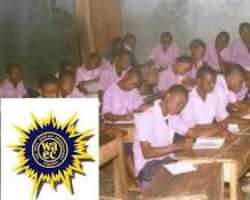Prof Egwu's antidote to mass failure in Mathematics out

Concerned citizens of Nigeria who have hitherto been perturbed by the woeful performances of students in Mathematics in their external examinations can now heave a sigh of relieve as a new book written to improve students' result in external examinations, was last week, at the Lagos Resource Centre, presented to the public.
The new book with title, Stop Mass Failure in Mathematics authored by Prof. (Engr) Sylvester Asamakaku Egwu, a Howard University School of Engineering trained Mechanical Engineer is aimed at eliminating current trend of poor performance by Senior Secondary School candidates in WAEC/NECO Mathematics examinations.
What stands the book out from every other work on mathematics according to the author who has lectured at various institutions of higher learning including University of Science and Technology, Port Harcourt, University of Zimbabwe, Harare, and a fellow of the University of Lagos, is that, 'It was carefully and deliberately put together as a new approach to Mathematics problems and solutions covering relevant and difficult topics with the problems arranged in a simple manner.'
With 15 chapters and 85 pages, the book which is on rescue mission according to the author came because, 'over the years, West African Examinations Council (WAEC) and National Examination Council (NECO) as well as other examination bodies have recorded abysmally poor results in Mathematics due to poor performances by candidates. The poor performance has led to unacceptable mass failure in Mathematics', adding that the book is based on extensive research and study by the author, of the past WAEC and other examinations questions.
The author believes that this new approach to mathematics will eliminate the mystery surrounding mathematics as difficult and an impediment to progress and also failure of young people in Nigeria.
Mr Dozie Irrechukwu who described the author as a relevant Nigerian and personal friend pointed out that the book is relevant to all Nigerians since every individual including traders encounter mathematics in their daily business.
Mr Irechukwu who commended the author for his contribution to the society, recalled that there was a time when corporate bodies in Nigeria insisted on employing only graduates with credits in mathematics stressing that, that singular prerequisite produced a lot of professionals. 'Things are no longer the same because Nigeria has de-emphasised the importance of credit in mathematics because of derailing system.' He said
